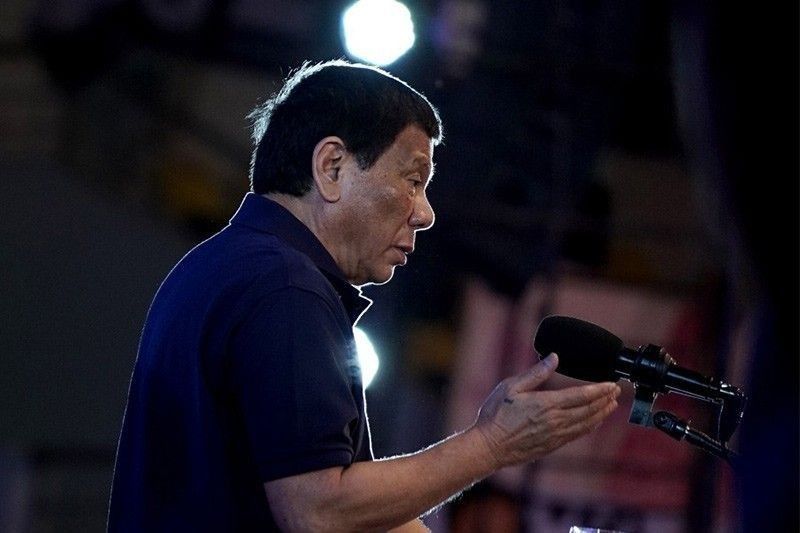Duterte issues EO adopting cash budgeting system

MANILA, Philippines — President Rodrigo Duterte signed an executive order adopting the cash budgeting system to address what he called "significant gaps" between spending outputs and annual appropriations that delay the delivery of public services.
The shift from a multi-year obligations-based to annual cash budgeting is contained in EO 91 signed by Executive Secretary Salvador Medialdea by authority of the President last September 9.
According to the Budget department, annual cash-based budgeting limits incurring obligations and disbursing payments for goods delivered and services rendered, inspected and accepted within the fiscal year. Under the system, the extent of budget implementation is just one year, with an extended payment period of three months after the fiscal year.
The cash budgeting system will start this year.
"Significant gaps between the actual expenditure outturns and annual appropriations translate to billions of pesos of delayed and foregone services, which should have been delivered to the general public," the order read.
"There is a need to improve the fiscal planning of government agencies through the implementation of an operational cash budget and by setting deadlines for obligation of funds and execution of projects during the fiscal year, in order to speed up the implementation of programs and to promptly deliver goods and services to our people," it added.
Under the EO, all authorized appropriations shall be available for obligation and disbursement only until the end of each fiscal year. Obligations incurred by the national government with each fiscal year shall be implemented during the same year.
An obligation is a commitment by a government agency arising from an act of a duly authorized official which binds the government to the immediate or eventual payment of a sum of money.
Goods and services that correspond to the obligations have to be delivered, rendered, inspected and accepted by the end of each fiscal year.
Payments for obligations incurred shall be made until the end of the three-month extended payment period unless another period has been determined by the budget department upon consultation with relevant agencies.
Appropriations covering financial subsidy to local government units will be available for obligation and release until the end of the succeeding fiscal year. Appropriations for the statutory shares of local governments shall be available for obligation and disbursement until fully expended.
All funds transferred between or among government agencies and local government shall not be considered disbursed until the transferred amounts have been actually used to pay for goods delivered and services inspected and accepted.
Any unreleased appropriations and unobligated allotments at the end of the fiscal year as well as unpaid obligations and undisbursed funds at the end of the three-month extended payment period shall be returned to the National Treasury. The funds will not be available for expenditure unless Congress passes a law allowing it. With regard to financial subsidies to local governments, the funds can be returned to the National Treasury after the end of the succeeding fiscal year.
Government entities enjoying fiscal autonomy, state universities and colleges, state-run firms and local governments shall strictly observe the validity of appropriations and comply with the reversion of funds.
For multi-year procurement projects or those whose implementation exceed one year, the budget department has to issue a multi-year contractual authority for national government agencies and qualified state-run firms before the conduct of procurement. Such authority may also be issued for single-year procurement projects or those with an implementation period of one year or less if they are scientific or involve research.
For multi-year public-private partnership projects with government undertakings allowed by law, the budget department has to issue a letter of commitment to cover the national government funding commitment.
A commitment is an obligation incurred by state agencies for which items have not been delivered and services not yet rendered.
The EO also allows state agencies to undertake procurement activities short of award to the extent consistent with the procurement law. Early procurement activities cover goods to be delivered, infrastructure projects to be implement or consulting services to be rendered in the following fiscal year pending the approval of the corresponding national budget. Early procurement activities shall start from the posting of the procurement opportunity, if required, until recommendation to award a contract to be submitted to the head of the procuring entity.
In the first year of the implementation of the cash budgeting, appropriations for infrastructure capital outlays, including subsidy releases to state-run firms for infrastructure projects, shall be valid for obligation until the end of the year. Completion of construction, inspection and payment has to be made on or before the end of 2020.
Appropriations for maintenance and other operating expenses and other capital outlays shall also be valid for obligation until the end of the year. Delivery, inspection, and payment should be made not later than June 30, 2020.
- Latest
- Trending





























